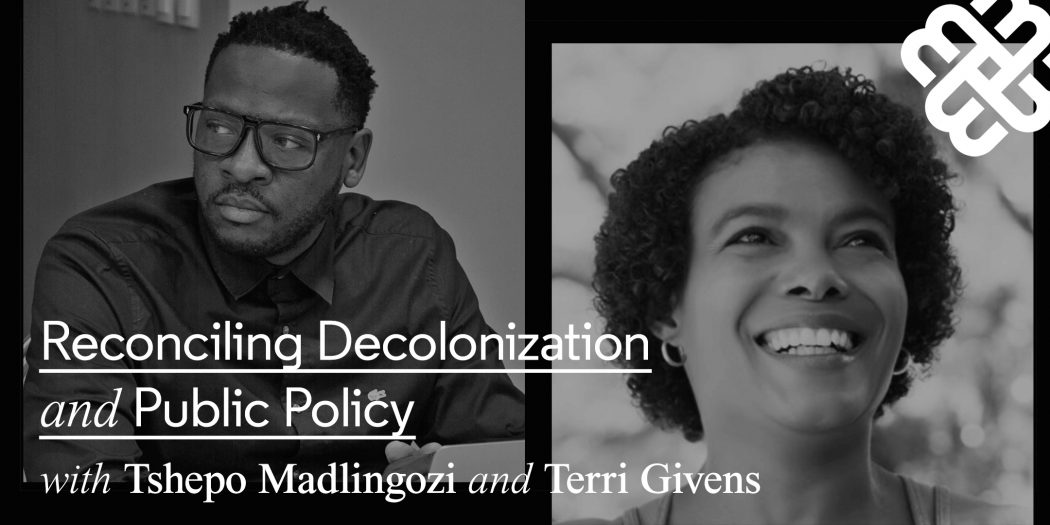On February 25, the Max Bell School of Public Policy hosted Reconciling Decolonization and Public Policy, a virtual event as part of McGill’s Black History Month celebrations.
The event featured guest speakers political scientist Terri Givens and professor of law Tshepo Madlingozi. Givens is an author of multiple books, a regular contributor to scholarship on issues related to race and politics, and the CEO and Founder of Brighter Professional Development, an organization that brings a modern approach to diversity training. She is also a political science professor at McGill and was appointed as the Provost’s Academic Lead and Advisor on McGill’s Action Plan to Address Anti-Black Racism.
As part of her role, Givens will lead strategic initiatives to support and mentor Black faculty and advise leaders at McGill on the needs of Black faculty and how to create a more equitable and inclusive environment. Madlingozi is the Associate Professor and Director of the Centre for Applied Legal Studies at Wits University in Johannesburg, South Africa. He is an editor for multiple journals on law and rights, specifically in South Africa, as well as a board member of a plethora of civil society organizations.
During the event, Givens explored the idea of radical empathy, a principle at the center of her book Radical Empathy: Finding a Path to Bridging Racial Divides. Givens shared that “looking back on [her] career and [her] personal life, [she] realized that structural discrimination was something that was still deeply impacting particularly African Americans” and “the ongoing struggle for equality and social justice.” She criticizes the way many people and fields of study, including political science, tend to be ahistorical, when the effects of slavery and colonialism still reverberate today. Radical empathy, Givens explained, “is not just about having empathy, it’s about taking action.” She suggests that we must decolonize the discipline of political science and look at the long-standing systems and practices that maintain neocolonialism and white supremacy in order to decolonize public policy and move towards a more just world.
Madlingozi discussed decolonization in the context of post-Apartheid South Africa. Despite being known to have a highly regarded constitution and what appear to be great policies, South Africa has high inequality, unemployment, and poverty. He explained that because South Africa was never decolonized, Black people are situated in a neocolonial, neo-apartheid society. Madlingozi explains that, in such a society contemporary Black South Africans “continue to be treated as subjects, compared to citizens who live in the urban areas.” According to Madlingozi, “in historically settler-colonial societies, public policy can not help but be approached from a decolonial perspective” in order for justice to occur. Failure to do so risks imitating Western policy, which is often ineffective applied to countries outside the West.
Givens also discussed the problematic distortion of history in the United States that affects the country’s ability to address issues related to race. She shared that there is a tendency to resist or avoid acknowledging racism in the country’s past and present. Especially with a Constitution that claims equal rights for all Americans, it is easy for many Americans to turn a blind eye to the fact that this constitutional equality is not the reality for many Americans. However, Givens strongly believes that without understanding history and the roots of racism in America, progress can not be made. Although small steps have been achieved and a few small doors have been opened to Black Americans, this approach to progress is highly individualistic. It fails to tackle the persistent structures of racism that Givens believes to be the true root of the problem. She shares that the crafting of public policy with intention can have a great impact on dismantling and rethinking systemic racist structures. Givens believes that the change that needs to occur is a “bottom-up process that starts with people of goodwill, as individuals trying to understand this history and taking personal responsibility for a push towards restorative justice.”
Madlingozi also shared how critical decolonization is to improve the current state of Black people in South Africa. Some civil society actors are in support of South Africa’s liberal democracy and its constitution. These people campaign for better implementation of the current constitution. Madlingozi said that under this form of compromise, “there is no way that it can lead to racial change” and only demands further assimilation into the neocolonial society. In order to restore the well-being of Black South Africans, citizens must argue for decolonial policies and radical redistribution of economic, cultural, and political power.”








